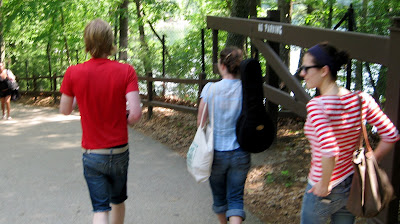Later I looked out across the water from the pier. We talked about jelly fish and analyzed couples near us, or one in particular--one my friends saw hours before, when it was only the man, waiting for the woman. His posture had apparently been impeccable. They wanted to know if she ever arrived, or if he was left waiting. Thankfully for his sake they were both there together, sitting in the same spot he first held alone. We noticed the distance between them, the ebb and flow of it. If they laughed. Which way her legs were crossed. Sadly we didn't think it was going very well. At one point they were looking at his phone.
Lisa wondered out loud why lights over water are so beautiful. We didn't have an answer. Just the solid feeling that they are, and then solidarity in that feeling. Next Elizabeth turned our gaze to the sky. She made out the Big Dipper. Or at least the handle of the Big Dipper. Which is remarkable, since it is so difficult in a city to see any stars in the sky. But they were there, if only faintly, and if only a few. At times this fact, this absence of stars, reminds me of a poem first introduced to me by my sister.
The pertinent stanza: "And now, each night I count the stars. And each night I get the same number. And when they will not come to be counted, I count the holes they leave." Even when they do not come, they are there. And so when I remember this poem, even when I cannot see them, I count them. When they do come, I also count them. Usually in Boston it is three, or two, or one. In Provo it is often more. In other places more still. I told my sister this one night in a message, my remembrance of the poem and my pattern of following it. A few days later she wrote, "Apparently tonight Eden and Mom were counting stars. There was one. Mom tried to sing Twinkle Twinkle with Eden, but halfway through Eden wanted to count the star again."

























